Fleurs du Mal Magazine


Or see the index
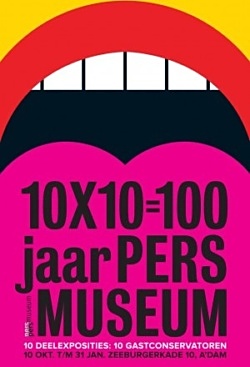
Op 4 november 2015 bestaat het Persmuseum 100 jaar. Duizenden boeken, honderden openingen, tientallen reizende exposities, talloze archieven, tienduizenden politieke tekeningen, duizenden foto’s en honderdduizenden kranten en tijdschriften. Maar de geschiedenis van 100 jaar Persmuseum bestaat uit zoveel meer dan een simpele opsomming van getallen.
100 jaar geleden werd de Stichting het Nederlands Persmuseum opgericht met een eerder door D.A. van Waalwijk aangekochte collectie dag- en weekbladen. Het Persmuseum staat bekend als het landelijke centrum van de Nederlandse pers en politieke prent. Het museum probeert geschiedenis, heden en toekomst van de Nederlandse pers zo goed mogelijk te documenteren, te bestuderen en toegankelijk te maken.
Dit is goed te zien aan een aantal stukken uit de collectie die het Persmuseum de afgelopen jaren zorgvuldig heeft opgebouwd:
De voorloper van Google, het knipselarchief van Matla
Zo is er de voorloper van moderne hulpmiddelen als Google en Wikipedia, het knipselarchief van Jean Hubert Matla. Ooit een begrip op redacties; honderden kleine kastjes met enveloppen vol met knipsels over bepaalde personen en specifieke gebeurtenissen. Om, wanneer nodig, gebruikt te worden als naslagwerk. Bedacht in de jaren ’30, maar vandaag de dag nog steeds actueel.
Het inktstel van Oltmans
Niet alleen het knipselarchief van Matla vertelt het verhaal over 100 jaar Persmuseum. Ook een item als het inktstel van Willem Oltmans laat zien waar het Persmuseum voor staat. De Nederlandse regering maakte de legendarische én beruchte journalist Oltmans jarenlang het werken onmogelijk. Na tal van rechtszaken haalde hij echter zijn gelijk en ontving hij een ongekende schadevergoeding van acht miljoen gulden. Het inktstel reisde met Oltmans mee over de hele wereld en ondanks de hinderingen tijdens zijn werk schreef hij stug door.
Een bijzonder paar van beeldhouwer Rudolf Belling
Dat zijn de man en vrouw op het schitterende geelkoperen beeld van de expressionistisch beeldhouwer Rudolf Belling. Zijn werk wordt in de Tweede
Wereldoorlog Entartet verklaard. Jarenlang stond het paar op de leestafel in de ontvangsthal van Het Volk/ de Arbeiderspers, nadat het in 1932 door 6.000 abonnees geschonken werd aan de krant.
Persmuseum
Zeeburgerkade 10, 1019 HA Amsterdam
T 020 6928810
Openingstijden
Dinsdag t/m vrijdag 10 -17 uur; zondag 12 -17 uur.
Bereikbaarheid
Openbaar vervoer: bus 22, 48 of 65; tram 7, 10, 14.
Zie ook www.persmuseum.nl
fleursdumal.nl digimagazine
More in: Art & Literature News, Museum of Literary Treasures, PRESS & PUBLISHING
Jo Glanville: The Charlie Hebdo principle (PEN director Jo Glanville responds to the withdrawal of six writers from PEN American Center’s annual gala over their decision to honour Charlie Hedbo)
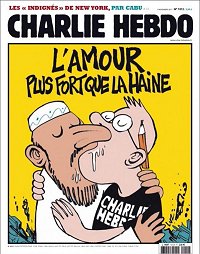 The distaste of eminent writers such as Peter Carey at PEN American Center’s decision to honour Charlie Hebdo at its gala next month, highlights once again the fundamental inconsistency that underpins attitudes towards free speech. Within days of the ‘Je Suis Charlie’ outpouring of solidarity, French police were arresting citizens for glorifying terrorism, while David Cameron’s government was busy pushing a counter terrorism bill through Parliament that would severely curtail universities’ liberty as a forum for freedom of expression. We may be used to the double standards of politicians, but what about writers?
The distaste of eminent writers such as Peter Carey at PEN American Center’s decision to honour Charlie Hebdo at its gala next month, highlights once again the fundamental inconsistency that underpins attitudes towards free speech. Within days of the ‘Je Suis Charlie’ outpouring of solidarity, French police were arresting citizens for glorifying terrorism, while David Cameron’s government was busy pushing a counter terrorism bill through Parliament that would severely curtail universities’ liberty as a forum for freedom of expression. We may be used to the double standards of politicians, but what about writers?
Becoming a member of PEN (one of the oldest human rights organisations in the world, and the largest international community of writers) means pledging ‘to oppose any form of suppression of freedom of expression in the country and community to which [writers] belong, as well as throughout the world wherever this is possible’. That’s a sentiment one would hope any writer might be happy to support and PEN depends, on a regular basis, on its members speaking out and standing up for fellow writers at risk. That’s the source of its influence and moral authority.
One of the writers, Francine Prose, a former PEN President, who decided to withdraw from the gala in protest, was reported as saying that giving an award signified ‘admiration and respect’ for the winner’s work. ‘I couldn’t imagine being in the audience when they have a standing ovation for Charlie Hebdo.’ But Charlie Hebdo is in fact being recognised for its courage: the courage to publish in the face of threats and intimidation, and the courage to continue publishing after the shocking murders in January.
We are more used to seeing that courage at a greater distance – in Mexico, Russia, Bangladesh or Egypt – and feel safe celebrating writers and journalists who may be prosecuted for outraging public morals in their own culture.
On our own doorstep, when faced with a satirical publication that provokes and offends, there is an underlying view implicit in the protest of Peter Carey and fellow writers that this kind of speech is not worth defending. Carey questioned whether it even was a freedom of expression issue; the writer Deborah Eisenberg voiced concerns (as have many others) about Charlie Hebdo’s ‘denigrating portrayals of Muslims’. Yet one of the most important, if uncomfortable, responsibilities for any free speech advocate is to defend the right to express speech which may be shocking, disturbing or offensive. Without that broad defence, the limits of everyone’s speech, as well as writers and publishers, are at risk of being restricted to suit the political agenda or prevailing morality, at a cost to artistic licence as well as individual freedom.
 Most of the great free speech battles in history have been fought over issues that were not deemed deserving of defence. The subjects of the famous obscenity prosecutions of the 70s in the UK (the Oz trial or Linda Lovelace’s memoir) were seen as publications of no merit. But what was at stake, as in the case of Charlie Hebdo, was the principle: the freedom to publish and the freedom to write. A freedom on which all writers depend. Victory in court (in the face of moral outrage) led to greater freedom for publishers and writers. In one of his last interviews, the writer and barrister John Mortimer, who famously defended both the Oz and the Lovelace trials, spoke of the retreat from ‘the abiding principle … that you lived in a country where you could read anything you like’. The growth of the idea that we should at all costs avoid causing offence (and that this may be even more important than defending the right to free speech) continues to undermine that principled protection for freedom of expression.
Most of the great free speech battles in history have been fought over issues that were not deemed deserving of defence. The subjects of the famous obscenity prosecutions of the 70s in the UK (the Oz trial or Linda Lovelace’s memoir) were seen as publications of no merit. But what was at stake, as in the case of Charlie Hebdo, was the principle: the freedom to publish and the freedom to write. A freedom on which all writers depend. Victory in court (in the face of moral outrage) led to greater freedom for publishers and writers. In one of his last interviews, the writer and barrister John Mortimer, who famously defended both the Oz and the Lovelace trials, spoke of the retreat from ‘the abiding principle … that you lived in a country where you could read anything you like’. The growth of the idea that we should at all costs avoid causing offence (and that this may be even more important than defending the right to free speech) continues to undermine that principled protection for freedom of expression.
Salman Rushdie, a notable supporter of English PEN and the PEN American Center, who has excoriated the withdrawal of Carey and others from the gala, was similarly criticised 26 years ago for causing gratuitous offence (by fellow writers) after the fatwa. Roald Dahl even called him a dangerous opportunist. There may be ‘good faith differences of opinion within our community’ as PEN American Center generously acknowledged on Sunday but it’s in the interests of all writers to stand up for the principle.
Jo Glanville is director of English PEN
(This piece first appeared in The Bookseller (28 April 2015). Source: website English PEN)
# More information on website English PEN
fleursdumal.nl magazine
More in: Art & Literature News, LITERARY MAGAZINES, PRESS & PUBLISHING, REPRESSION OF WRITERS, JOURNALISTS & ARTISTS
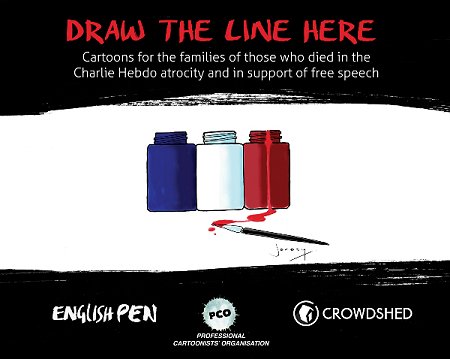
Draw the Line Here: Cartoonists respond to the Charlie Hebdo killings. Cartoons for the families of the victims of the Charlie Hebdo attacks, and in support of free speech.
English PEN is delighted to announce the publication of Draw The Line Here, a collection of cartoons drawn in response to the Charlie Hebdo attacks in Paris in January 2015.
The book is a collaboration between the Professional Cartoonists’ Organisation (PCO), Crowdshed, and English PEN. It features cartoons drawn by British artists in the days immediately after the attacks. The work of 66 cartoonists is featured, including Steve Bell, Dave Brown, Martin Rowson, Peter Brooke and Ralph Steadman.
 Proceeds from the book will be split equally between the fund for the victims of the Charlie Hebdo murders, and English PEN’s Writers at Risk programme.
Proceeds from the book will be split equally between the fund for the victims of the Charlie Hebdo murders, and English PEN’s Writers at Risk programme.
Production of the book was made possible by a crowd-funding campaign launched in February. Over 200 people pledged their support to the project, and will be receiving their copies of the book in the coming days.
Draw The Line Here includes a foreword by Libby Purves, patron of the PCO, who writes:
Some cartoons here are gentle, others savage; some merely encapsulate the bafflement and sadness of a world where mockery is met not with the proper response, a shrug, but with murder. Again and again the theme is of the fragility of the sceptical, laughing pencil: its simplicity and its splendour, the opposite of the vainglorious, meaningless squalor of the gun and the bomb.
Jo Glanville, director of English PEN, said:
We are extremely grateful to the PCO and to Crowdshed for choosing English PEN as a beneficiary of this project, and of course to all the cartoonists who have contributed to the book. By exercising their own right to freedom of expression, these artists are helping to defend the free speech of others.
The publication of this book could not be more timely. Sunday 3 May is World Press Freedom Day, the perfect time to stand in solidarity with Charlie Hebdo.
Draw The Line Here may be purchased online at: www.englishpen.org/campaigns/draw-the-line-here
Supporters to the Crowdfunding campaign will receive their copies in the coming days
Books cost UK £15.00 each. UK delivery is £2.00 and international delivery is £4.00.
# More information on website English PEN
fleursdumal.nl magazine
More in: - Book News, Art & Literature News, LITERARY MAGAZINES, PRESS & PUBLISHING, REPRESSION OF WRITERS, JOURNALISTS & ARTISTS
Gesteund door Nederlandse mediabedrijven, zijn jonge filmreporters uit de sloppenwijken van Kenia succesvol met eigen mediabedrijf: ‘AFRICAN SLUM JOURNAL’
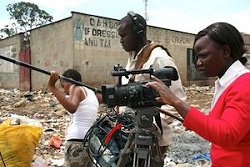 Met het uitkomen van de 100ste editie van ‘African Slum Journals’ hebben tien jonge Afrikaanse reporters uit de sloppenwijken van Nairobi, Kenia hun eigen mediabedrijf stevig vorm gegeven. Ze maken journalistieke filmproducties voor de Keniaanse en internationale markt. Op 4 mei a.s. in de week van de ‘Internationale Dag van de Persvrijheid’ verschijnt de 100ste aflevering van African Slum Journal!
Met het uitkomen van de 100ste editie van ‘African Slum Journals’ hebben tien jonge Afrikaanse reporters uit de sloppenwijken van Nairobi, Kenia hun eigen mediabedrijf stevig vorm gegeven. Ze maken journalistieke filmproducties voor de Keniaanse en internationale markt. Op 4 mei a.s. in de week van de ‘Internationale Dag van de Persvrijheid’ verschijnt de 100ste aflevering van African Slum Journal!
In 2011 richtten de jonge filmreporters met steun van Voices of Africa Media Foundation (VoAMF) het eigen mediabedrijf Nairobi Community Media House (NCMH) op. Van hieruit geven ze hun sloppenwijken een stem. Elke twee weken maken ze een korte reportage, waarmee ze op verrassende wijze het leven in de ‘slums’ in beeld brengen voor een breed internationaal publiek.
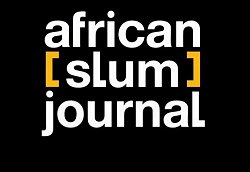 In de African Slum Journals vertellen de jonge reporters de verhalen van slumbewoners. De video’s tonen moeilijke én mooie beelden over het leven in de sloppen. Elke twee weken verschijnt een nieuw Journal over leven, werken, wonen, liefhebben, opvoeden, leren en overleven in de slums. Met uiteenlopende thema’s zoals kunst, ondernemen, recycling, alcoholgebruik, koken of mode.
In de African Slum Journals vertellen de jonge reporters de verhalen van slumbewoners. De video’s tonen moeilijke én mooie beelden over het leven in de sloppen. Elke twee weken verschijnt een nieuw Journal over leven, werken, wonen, liefhebben, opvoeden, leren en overleven in de slums. Met uiteenlopende thema’s zoals kunst, ondernemen, recycling, alcoholgebruik, koken of mode.
Pim de Wit, directeur VoAMF: “De Journals geven ons een authentiek beeld over wat het echt betekent om in een sloppenwijk te leven en te overleven. Door juist ‘slum’bewoners een stem te geven wordt bovendien de locale mediasector in Afrika versterkt. Niet door mensen van buitenaf, maar juist door mensen die in de sloppenwijk wonen. Dat is hard nodig, omdat een zwakke media corruptie in de hand werkt.”
Op dit moment werken er tien reporters voor het NCMH. Sinds de oprichting ontvangen zij een salaris en hebben zij een bestaan voor zichzelf en hun familie kunnen opbouwen. Zo is het project duurzaam.”
In de jaren 2013 en 2014 heeft het NCMH een kleine winst kunnen boeken, die dit jaar een hoger peil moet bereiken om echt onafhankelijk te worden. Momenteel heeft VoAMF nog 37% van de aandelen van het NCMH. De overige 63% is al in handen van de werknemers van NCMH. In de loop van dit jaar zal VoAMF haar aandeel geheel overdragen en laten we graag een financieel gezond mediabedrijf achter.
Nairobi Community Media House gebruikt het African Slum Journal platform om nog veel meer reportages over de slums in de openbaarheid te brengen. Het is mogelijk voor NGO’s om hun projecten in Kenia via een Slum Journal onder de aandacht te brengen. Hiervoor is een partnership programma ontwikkeld.
Alle African Slum Journal video’s zijn via www.africanslumjournal.com te bekijken.
fleursdumal.nl magazine
More in: Art & Literature News, AUDIO, CINEMA, RADIO & TV, FDM in Africa, PRESS & PUBLISHING
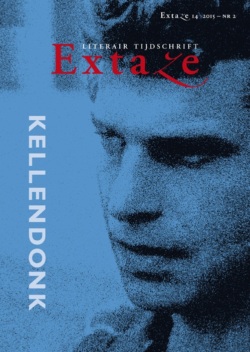 Speciaal themanummer Literair tijdschrift Extaze tijdens het Kellendonk-jaar 2015
Speciaal themanummer Literair tijdschrift Extaze tijdens het Kellendonk-jaar 2015
Ook dit jaar maakt Literair Tijdschrift Extaze weer een bijzonder themanummer. Vijfentwintig jaar geleden is de Nederlandse schrijver Frans Kellendonk overleden, voor Extaze reden om een apart nummer over zijn leven en schrijverschap te plannen. Begin april is een crowdfundingactie gestart via website: www.voordekunst.nl
Het Kellendonk-nummer, zoals dat de redactie van Extaze voor ogen staat, kan niet met de eigen bescheiden middelen gefinancierd worden. De kosten voor het onderzoek, de uitwerking van de stukken, het beeldend werk (waarvoor een gerichte opdracht is gegeven aan Rens Krikhaar, een beeldend kunstenaar te Den Haag wiens stijl verwantschap toont met het werk van Kellendonk), de speciale vormgeving, net als het beeldend werk aangepast aan het onderwerp, de extra drukkosten die de bijzondere vormgeving en het extra aantal pagina’s met zich meebrengen en de ‘anders dan andere’ presentatie, waarvoor sprekers en podiumartiesten gerichte opdrachten krijgen, noodzaken de redactie een beroep op u te doen.
# Meer informatie over Frans Kellendonk op website Kellendonk-fonds
fleursdumal.nl magazine
More in: Art & Literature News, Frans Kellendonk, LITERARY MAGAZINES, PRESS & PUBLISHING
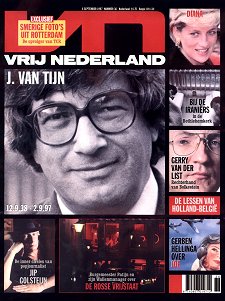 Op donderdag 9 april wordt het archief van prominent journalist en oud-hoofdredacteur van Vrij Nederland, Joop van Tijn overgedragen aan het Persmuseum.
Op donderdag 9 april wordt het archief van prominent journalist en oud-hoofdredacteur van Vrij Nederland, Joop van Tijn overgedragen aan het Persmuseum.
De middag zal worden ingeleid door journalist en programmamaker Coen Verbraak, met medewerking van Max van Weezel en John Jansen van Galen. Het museum richt ter gelegenheid hiervan een kleine expositie in van foto’s en enkele markante stukken uit het archief.
Het Persmuseum herbergt vele honderden belangrijke archieven van kranten en individuele journalisten en hoofdredacteuren. Het archief van Joop van Tijn is een van de belangrijkste archieven die het museum de afgelopen jaren heeft mogen ontvangen.
Joop van Tijn (Batavia,12 september 1938 – Amsterdam, 2 september 1997) studeerde geschiedenis aan de Universiteit van Amsterdam en schreef voor het roemruchte studentenblad Propria Cures. In 1961 werd hij bij de Haagse Post aangenomen als journalist. Daar groeide de bekendheid van zijn kwaliteiten als interviewer. In 1965 trad hij in dienst van oud-verzetskrant Vrij Nederland. Vanuit een diepgewortelde wens ‘de macht te ontrafelen’ schreef hij vooral over binnenlandse en buitenlandse politiek. In 1985 werd hij adjunct-hoofdredacteur van ‘de krant’ zoals hij hem zelf noemde en vanaf 1991 was hij samen met Rinus Ferdinandusse hoofdredacteur.
Naast zijn journalistieke werk trad Van Tijn op in spraakmakende televisieprogramma’s als ‘Zo is het toevallig ook nog eens een keer’, ‘Haagsche Kringen’ en ‘Het Capitool’ en was hij bijna een kwart eeuw gespreksleider van het radioprogramma ’Welingelichte Kringen’.
Vanwege zijn status als mediapersoonlijkheid werd hij veelvuldig gevraagd als presentator, dagvoorzitter, spreker en jurylid.
Joop van Tijn overleed in 1997 op 58-jarige leeftijd.
Het archief bevat algemene stukken als correspondentie en blocnotes, persoonlijke stukken en stukken betreffende zijn werk voor Haagse Post en Vrij Nederland en zijn activiteiten voor radio en televisie.
Als journalist had Joop van Tijn vooral veel interesse voor de nationale politiek: we zien veel dossiers terug over kabinetsformaties, onthullingen, schandalen en interviews met ministers en andere politici. Wat betreft het buitenland ligt de nadruk op de Verenigde Staten, Indonesië en Israël. Uit zijn vele nevenactiviteiten blijkt een grote interesse voor kunst, cultuur, literatuur en sport.
De begeleidende compacte expositie in het Persmuseum is te zien tot en met 10 mei 2015.
Persmuseum
Zeeburgerkade 10,1019 HA Amsterdam
T 020 6928810 / E info@persmuseum.nl/ www.persmuseum.nl
Openingstijden: Dinsdag t/m vrijdag 10 – 17 uur; zondag 12 -17 uur.
Bereikbaarheid: Openbaar vervoer: bus 22, 48 of 65. Tram 7, 10 en 14.
Zie ook www.persmuseum.nl
fleursdumal.nl magazine
More in: Art & Literature News, DICTIONARY OF IDEAS, PRESS & PUBLISHING
 Be part of the movement for peace and tolerance
Be part of the movement for peace and tolerance
Support the project: ‘Draw The Line Here’
Come together in support of Charlie Hebdo and freedom of expression
The tragic events in Paris last week have shaken many of us to the core, but rising from the ashes is a growing global movement in support of freedom of expression and religious tolerance.
To celebrate this and raise much needed funds for the families and victims of the Charlie Hebdo atrocities, the Professional Cartoonists’ Organisation has collaborated with English PEN and CrowdShed to create ‘Draw The Line Here’ (Tracer La Ligne Ici), a specially curated collection of cartoons produced in the days immediately following the Paris attacks.
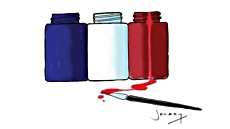 Once production and publishing costs for Draw The Line Here have been covered, half of the proceeds from this crowdfund campaign will go to English PEN, a registered charity working to promote freedom of expression, and the other half will be donated to the fund for the families of the victims.
Once production and publishing costs for Draw The Line Here have been covered, half of the proceeds from this crowdfund campaign will go to English PEN, a registered charity working to promote freedom of expression, and the other half will be donated to the fund for the families of the victims.
Be part of the movement for peace and tolerance
This symbol of the pen being mightier than the gun has inspired us all. Draw The Line Here has been set up to let us all contribute to the creation and publication of a book that celebrates the timeless art so brilliantly presented by Charlie Hebdo, and memorialise those who paid with their lives for what they believed in.
By supporting and funding this project you’ll be supporting and funding English PEN in their vital work to defend and promote freedom of expression around the world and lend much needed aid to the victims’ families.
fleursdumal.nl magazine
More in: Art & Literature News, LITERARY MAGAZINES, PRESS & PUBLISHING, REPRESSION OF WRITERS, JOURNALISTS & ARTISTS
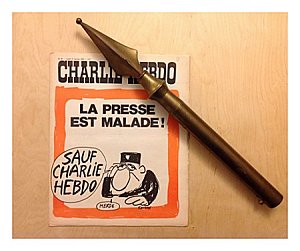
Amsterdam 11012015
Het Persmuseum eert het Franse satirische tijdschrift Charlie Hebdo vanaf vandaag met een expositie rond illustraties en illustratoren die werken op het scherpst van de snede van de persvrijheid.
In het Persmuseum in Amsterdam-Oost zullen vanaf zondag 11 januari exemplaren worden geëxposeerd van het weekblad dat deze week getroffen werd door een terreuraanslag waarbij tien medewerkers, een bewaker en een politieagent om het leven kwamen. Ook zijn andere spotprenten te zien die gemaakt zijn naar aanleiding van de aanslag.
Persmuseum directeur Niels Beugeling: “We hebben met man en macht gewerkt om deze expositie rond te krijgen. Die is een ode aan het getroffen blad en de tekenaars, maar vooral ook aan het onverwoestbare recht op vrijheid van meningsuiting.”
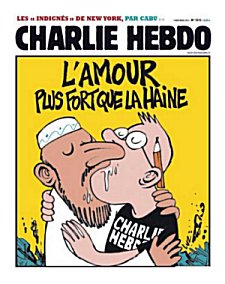 Niels Beugeling: “De aanslag in Parijs is een absolute ramp. Niet alleen voor het blad en de medewerkers, maar voor de satire en de vrijheid van de pers wereldwijd. Het blad, zonder foto’s maar met bijzondere tekeningen en reportages, dat zich zonder voorbehoud tegen alles en iedereen keert, is in één klap beroofd van een aantal van zijn beste tekenaars en meest toegewijde medewerkers: Cabu, Wolinski, Charb, Honoré en Tignous. Iedereen is met stomheid geslagen, maar die stomheid zal, Charlie Hebdo indachtig, niet lang aanhouden.”
Niels Beugeling: “De aanslag in Parijs is een absolute ramp. Niet alleen voor het blad en de medewerkers, maar voor de satire en de vrijheid van de pers wereldwijd. Het blad, zonder foto’s maar met bijzondere tekeningen en reportages, dat zich zonder voorbehoud tegen alles en iedereen keert, is in één klap beroofd van een aantal van zijn beste tekenaars en meest toegewijde medewerkers: Cabu, Wolinski, Charb, Honoré en Tignous. Iedereen is met stomheid geslagen, maar die stomheid zal, Charlie Hebdo indachtig, niet lang aanhouden.”
Het Persmuseum is de nationale bewaarplaats voor het journalistieke erfgoed. Het museum beheert een omvangrijke collectie kranten en tijdschriften vanaf 1600, een verzameling affiches en overige reclame-uitingen met betrekking tot de pers, een unieke collectie (originele) politieke tekeningen en persgrafiek, tal van archieven en foto’s rond journalisten en de persbedrijfstak, en een uitgebreide bibliotheek.
Het Persmuseum staat in Nederland pal voor het belang van het recht op informatie en van de persvrijheid. Het ziet het als zijn missie om, met zijn collectie als uitgangspunt, voor een breed publiek uitingen en uitingsvormen van de media en journalistiek te verzamelen, te bewaren en het belang ervan in alle facetten over het voetlicht te brengen.
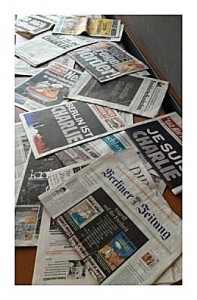
Bij de aanslag van deze week kwamen onder cartoonisten Georges Wolinski, Jean Cabut, Philippe Honoré, Bernhard Verlhac en Stéphane Charbonnier om het leven.
Veteraan en mede-oprichter van het blad Georges Wolinksi (80), werkte al voor Hara-Kiri in de jaren ’60 en sinds 1970 voor Charlie Hebdo, maar ook voor het dagblad Libération, en voor Paris-Match en L’Écho des savanes.
Het eerste werk van Cabu (pseudoniem van Jean Cabut), verscheen in 1954 in een regionaal dagblad. De 76-jarige tekenaar en mede-oprichter van het blad, tekende in 2006 de profeet Mohammed voor de cover van Charlie Hebdo, als antwoord op de cartoonrellen in Denemarken.
Charb (pseudoniem van Stéphane Charbonnier, 47) was hoofdredacteur van het magazine. Hij was zowel tekenaar als journalist en had een vaste rubriek in het magazine: ‘Charb n’aime pas les gens’ (Charb houdt niet van de mensen).
Tignous (pseudoniem van Bernard Verlhac, 57) tekende zowel voor Charlie Hebdo, de Marianne en de Fluide Glacial. Hij ondertekende zijn werk altijd met Oom Bernard.
Philippe Honoré, 74, werkte net als Tignous sinds 1992 voor Charlie Hebdo. Zijn werk wordt gekenmerkt door een bijzondere grafische stijl die doet denken aan lino- of houtsneden.
Persmuseum
Zeeburgerkade 10,
1019 HA Amsterdam
020 6928810
info@persmuseum.nl
# Website persmuseum www.persmuseum.nl
fleursdumal.nl magazine
More in: Art & Literature News, LITERARY MAGAZINES, MUSEUM OF PUBLIC PROTEST, PRESS & PUBLISHING, REPRESSION OF WRITERS, JOURNALISTS & ARTISTS
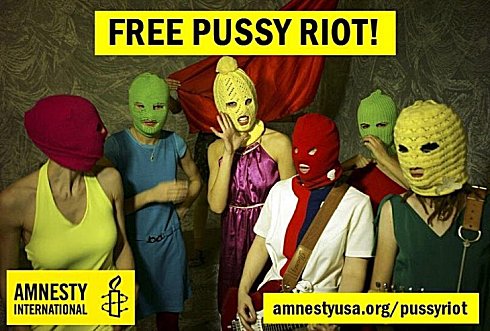
Russian court finds Pussy Riot guilty
A Russian court’s decision today to find members of the punk rock protest band Pussy Riot guilty of “hooliganism” is a bitter blow for freedom of expression in the country, Amnesty International said today.
Amnesty International said it believed that the trial of the Pussy Riot defendants – Maria Alekhina, Ekaterina Samutsevich and Nadezhda Tolokonnikova – was politically motivated, and that they were wrongfully prosecuted for what was a legitimate – if potentially offensive – protest action.
The organization considers all three activists to be prisoners of conscience, detained solely for the peaceful expression of their beliefs.
“The Russian authorities should release the members of Pussy Riot immediately and unconditionally,” said John Dalhuisen, Director of Amnesty International’s Europe and Central Asia Programme.
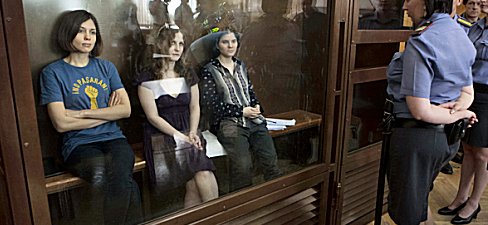
“A number of measures restricting the freedom of expression and association have been introduced in response to the wave of protest that accompanied the recent parliamentary and presidential elections. This trial is another example of the Kremlin’s attempts to discourage and delegitimize dissent. It is likely to backfire.”
Pussy Riot performed the protest song “Virgin Mary, redeem us from Putin” in Christ the Saviour Cathedral in Moscow on 21 February, with the group members covering their faces in balaclavas.
The song called on the Virgin Mary to become a feminist and banish Vladimir Putin. It also criticized the dedication and support shown to Putin by some Russian Orthodox Church representatives. It was one of a number of performances intended as a protest against Vladimir Putin in the run-up to Russia’s presidential elections in March.
The Russian authorities subsequently arrested Maria Alekhina and Nadezhda Tolokonnikova on 4 March, and Ekaterina Samutsevich on 15 March, claiming they were the masked singers.
The Pussy Riot trial started on 30 July in Moscow’s Khamovnicheskii District Court and was over in eight days. The judge dismissed most of the defence team’s requests to call up witnesses. There were concerns that fair trial standards might have been violated.
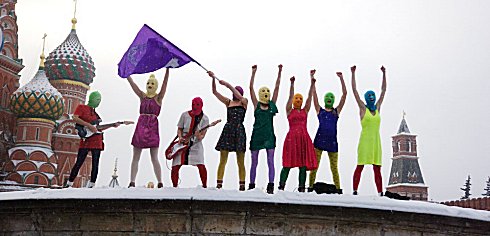
Russian court jails Pussy Riot for two years
A Russian court’s decision today to find guilty members of the punk rock protest band Pussy Riot is a bitter blow for freedom of expression in the country, Amnesty International said today.
Three members of the all-female group were charged with “hooliganism on grounds of religious hatred” after they sang a protest song in Moscow’s main Orthodox cathedral in February.
The judge sentenced them to two years imprisonment in a penal colony. The lawyers for the three said they were planning to appeal the decision.
Amnesty International said it believed that the trial of the Pussy Riot defendants – Maria Alekhina, Ekaterina Samutsevich and Nadezhda Tolokonnikova – was politically motivated, and that they were wrongfully prosecuted for what was a legitimate – if potentially offensive – protest action.
The organization considers all three activists to be prisoners of conscience, detained solely for the peaceful expression of their beliefs.
“The Russian authorities should overturn the court ruling and release the members of Pussy Riot immediately and unconditionally,” said John Dalhuisen, Director of Amnesty International’s Europe and Central Asia Programme.
“What Maria Alekhina, Nadezhda Tolokonnikova and Ekaterina Samutsevich did was calculated to shock – and did shock many. But in sentencing them to two years’ imprisonment, Russia has set the limits of freedom of expression in the wrong place.”
“A number of measures restricting the freedom of expression and association have been introduced in response to the wave of protest that accompanied the recent parliamentary and presidential elections. This trial is another example of the Kremlin’s attempts to discourage and delegitimize dissent. It is likely to backfire.”
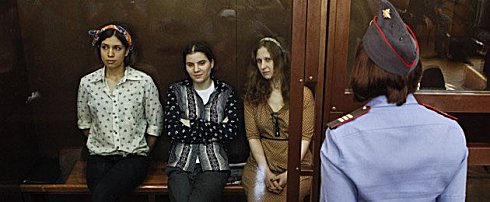
Background
Pussy Riot performed the protest song “Virgin Mary, redeem us from Putin” in Christ the Saviour Cathedral in Moscow on 21 February, with the group members covering their faces in balaclavas.
The song called on the Virgin Mary to become a feminist and banish Vladimir Putin. It also criticised the dedication and support shown to Putin by some Russian Orthodox Church representatives. It was one of a number of performances intended as a protest against Vladimir Putin in the run-up to Russia’s presidential elections in March.
The Russian authorities subsequently arrested Maria Alekhina and Nadezhda Tolokonnikova on 4 March, and Ekaterina Samutsevich on 15 March, claiming they were the masked singers.
The Pussy Riot trial started on 30 July in Moscow’s Khamovnicheskii District Court and was over in eight days. The judge dismissed most of the defence team’s requests to call up witnesses. There were concerns that fair trial standards might have been violated.
The case generated a wide debate on blogs, social networks and in the media about freedom of expression, the place of the Church in a modern secular state and the independence of courts.
In June, more than 200 Russian cultural figures, well-known writers, musicians and actors, among others, signed an open letter in support of Maria Alekhina, Nadezhda Tolokonnikova and Ekaterina Samutsevich. It was then posted on the Echo Moskvy radio web site and collected around 45,000 further signatures.
Also in June, a group of Orthodox believers sent an open letter to Patriarch Kirill, the leader of the Russian Orthodox Church, asking for mercy for the three arrested women.
In August, a group of lawyers published an open letter in which they stated that the actions of the three women could not be qualified as a crime and that bringing charges against them was in violation of the Russian law.
The Pussy Riot case received a broad coverage abroad and generated the support of many international artists, including Sting, Madonna, Yoko Ono and Bjork.

Source: Website Amnesty International
fleursdumal.nl magazine
More in: # Music Archive, Art & Literature News, MUSEUM OF PUBLIC PROTEST, PRESS & PUBLISHING, REPRESSION OF WRITERS, JOURNALISTS & ARTISTS, STREET POETRY
Thank you for reading Fleurs du Mal - magazine for art & literature